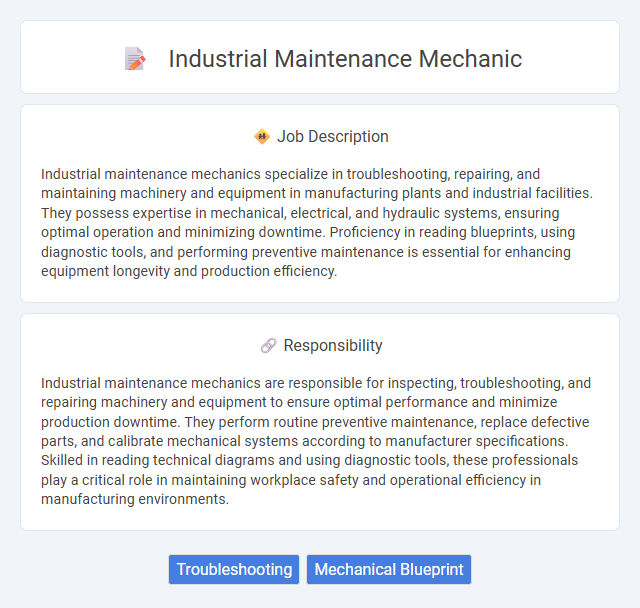
Industrial maintenance mechanics specialize in troubleshooting, repairing, and maintaining machinery and equipment in manufacturing plants and industrial facilities. They possess expertise in mechanical, electrical, and hydraulic systems, ensuring optimal operation and minimizing downtime. Proficiency in reading blueprints, using diagnostic tools, and performing preventive maintenance is essential for enhancing equipment longevity and production efficiency.
Individuals who are physically fit and possess strong problem-solving skills are more likely to be suitable for an industrial maintenance mechanic role. Those with good hand-eye coordination, mechanical aptitude, and the ability to work in potentially noisy or hazardous environments may adapt well to the demands of this job. People who prefer routine tasks or have limited technical interest might find this position challenging or less compatible with their strengths.
Qualification
An Industrial Maintenance Mechanic requires a solid foundation in mechanical, electrical, and hydraulic systems to troubleshoot and repair industrial equipment efficiently. Certifications such as Certified Maintenance & Reliability Technician (CMRT) or specialized training in PLC programming and CAD software enhance job qualifications. Strong problem-solving skills combined with hands-on experience in preventive maintenance and machinery diagnostics are essential for success in this role.
Responsibility
Industrial maintenance mechanics are responsible for inspecting, troubleshooting, and repairing machinery and equipment to ensure optimal performance and minimize production downtime. They perform routine preventive maintenance, replace defective parts, and calibrate mechanical systems according to manufacturer specifications. Skilled in reading technical diagrams and using diagnostic tools, these professionals play a critical role in maintaining workplace safety and operational efficiency in manufacturing environments.
Benefit
Industrial maintenance mechanic jobs likely offer substantial benefits including competitive salaries, comprehensive health insurance, and retirement plans. Opportunities for skill development and career advancement may increase job security and long-term earning potential. Employers probably provide paid training and certifications, enhancing expertise and workplace safety.
Challenge
Industrial maintenance mechanic roles likely involve complex problem-solving challenges due to the need to diagnose and repair diverse machinery efficiently. The probability of encountering unexpected equipment failures may demand quick decision-making and adaptability. Constant technological advancements could require ongoing learning to keep skills current and maintain optimal operational performance.
Career Advancement
Industrial maintenance mechanics with advanced skills in PLC programming, hydraulic systems, and predictive maintenance techniques increase their opportunities for career advancement. Mastery of diagnostic tools and certifications like Certified Maintenance & Reliability Technician (CMRT) can lead to supervisory or engineering roles. Progression often involves specialization in automation or facility management, boosting earning potential and job security.
Key Terms
Troubleshooting
Industrial maintenance mechanics specialize in troubleshooting complex machinery and equipment to identify malfunctions and prevent costly downtime. They use advanced diagnostic tools and techniques to systematically analyze mechanical, electrical, and hydraulic systems, ensuring rapid and accurate fault detection. Expertise in troubleshooting enhances operational efficiency and extends the lifespan of industrial assets in manufacturing and production environments.
Mechanical Blueprint
Industrial maintenance mechanics utilize mechanical blueprints to accurately diagnose, repair, and maintain complex machinery and equipment in manufacturing environments. Mastery of mechanical blueprints ensures precise interpretation of components, alignment specifications, and system layouts, critical for minimizing downtime and optimizing production efficiency. Proficiency in reading and applying detailed technical diagrams directly enhances troubleshooting accuracy and maintenance outcomes in industrial settings.
 kuljobs.com
kuljobs.com